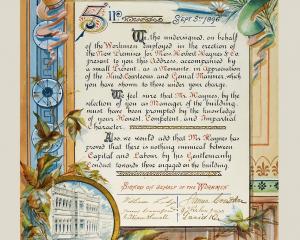
The moment I am most pleased renowned Oxford University ethno-ornithologist, Assoc Prof Andy Gosler has become a Christian is when I phone his wife in the middle of the night.
Proving there was a moment when I phoned her is more problematic.
It is not quite noon. Prof Gosler is somewhere in New Zealand, having arrived two days earlier from the United Kingdom. The vice-chairman of the Institute of Human Sciences and associate professor in the Institute of Field Ornithology, both at Oxford, he is here for the start of a two-week speaking tour on topics as intriguing and potentially explosive as The Cultural Evolution of Evolution and Beyond Conflict: Evolution, Science and God.
The main interview has been conducted by phone, more than a fortnight prior. But, on reflection, a couple of key questions remain. There is an urgent need to track Prof Gosler down. The one phone number to hand is dialled, in hope it is for a cellphone with roaming turned on. The possibility it is a United Kingdom landline number, and the time zone implications of phoning the other side of the globe at noon in New Zealand are lost in the rush.
A woman's voice answers. What do I want? Am I aware it is a quarter to one in the morning? I gulp and hope for the best, suddenly pleased the good professor and, hopefully, his wife are now Christians. Not pleased they have "found God" or pleased for their "eternal salvation", but simply because Christians are supposed to turn the other cheek. Phoning after midnight must count as a slap on the face, surely? The maxim holds true, the justifiable bollocking does not materialise. I am given a cellphone number, apologise repeatedly and hang up.
Not that the Goslers are pushovers. I could hear that in her voice. The realisation that Prof Gosler also knows his mind and is happy to speak it came quickly during the earlier interview.
I had phoned on a dark winter's evening in Dunedin. More than 19,000km away, he answered on a summer's morning at his home on the rural outskirts of Oxford.
What he said, from his understanding of Biblical studies and evolution will doubtless stir controversy at both extremes. At least, in New Zealand.
He gets straight to the point. New Zealand, he says, might be "a bit behind the curve". In Britain and Europe, most churches are "well beyond squabbling over evolution".
"You know, the Archbishop of Canterbury, in the 1860s, gave a sermon in which he was talking about the origin of species," Prof Gosler says.
"And he said,`Well, how wonderful; God creates creation to create itself'.
"But," adds Prof Gosler, "that's theologically sophisticated people.
"The majority of people don't know how to read the Bible."
The Genesis creation account at the beginning of the Bible is not supposed to be taken literally, he says.
It is allegory, poetry, a deeper wisdom.
"It is, if you like, a prediction written thousands of years ago about our relationship with the planet and our relationship with what we call God as the creative power behind everything we see."
He is dismayed that the first three chapters of Genesis have become polarising, unnecessarily forcing people to choose between faith and science.
"It's sad for so many reasons. But it's sad for people of faith because it discourages them from entering into the real depth of meaning that is in the Bible. If you literally believe everything was created within a week then you are failing to understand the symbolic meanings within the text, that it is all about humans' relationship to God."
He does not leave evolution unexamined either.
The understanding of evolution has been shaped by knowledge and coloured by culture, he says.
"From Darwin to Dawkins, evolutionary biology has reflected the culture of its time as much as the reality of evolution."
Darwin did not know about genetics. So, he did not know where the variation between individuals came from that his selection operated on.
During the 1920s and 1930s, the new science of genetics got bolted on to the Darwinian model of evolution.
"And I can't help but reflect on how Modernism, that comes out of the 1930s, gets linked to eugenics and the Holocaust and some very dark times in human history."

"As a result, all genetic change was viewed as random errors, random mutations. So, the variation that Darwin's natural selection was operating on was seen to be selecting from a load of errors."
A new understanding has emerged in recent years.
"What we've discovered is that a lot of genetic change is actually directed by the cell. So, organisms modify themselves.
"We know there is natural selection. We know there is sexual selection. But evolution is a much more directed process, in the sense that plants and animals modify their own genomes in order to adapt themselves and their offspring better to their environment."
And then, Prof Gosler brings God and evolution, faith and science, into the same room.
"While the evidence of evolution is clear, it is only now with sophisticated molecular biological techniques that the exquisite complexity of the evolutionary process is being exposed. And, in its beauty, God's wisdom too is revealed.
"We've been somewhat distracted ... with an intense focus on genes and the idea that all life exists just to make copies of genes. If there is a purpose in life, it is not to be found in the objectives of genes because genes don't have objectives, they are molecules. Where you find purpose is not within the system, it's outside."
His comments raise questions about the curious circumstances of his conversion.
I have been told Prof Gosler became a Christian after reading the works of acclaimed evolutionary biologist and staunch atheist Prof Richard Dawkins.
How did that happen? Isn't it supposed to have the opposite effect?
"Well, that makes it sound like a simple thing - you read a book and the next day you get baptised," Prof Gosler says with a laugh.
"This was something that was niggling away at me my whole life."
Prof Gosler was raised in West London, in a non-religious Jewish family that attended synagogue.
"I ditched anything formally religious after my bar mitzvah, in 1971, and devoted all my time to birds and ecology and conservation."
In 1978, as an undergraduate studying environmental biology at the University of Wales, he read Prof Dawkins' recent best-seller The Selfish Gene, which argued that behaviour was genetically determined. Prof Gosler saw in the book a philosophical inconsistency but kept reading successive publications while doing a master's degree, at Reading, and a PhD in ornithology in the zoology department at Oxford.
Prof Dawkins was based in the same department. He later became Oxford's Professor for Public Understanding of Science. He is now retired.
"So, I was reading his books in the 1990s," Prof Gosler recalls.
"There was this kind of drip-feed of atheism, which runs something like `Oh, look what these silly Christians believe'.
"That irritated me for two reasons. Firstly, I didn't want to know what Christians believed. It was irrelevant to the argument. I just wanted him to tell me about evolution.
"And the other thing was, I knew plenty of Christians who didn't believe that."
With Prof Dawkins continually putting Christianity in front of him, Prof Gosler eventually decided to look at it for himself.
"When someone tells you not to do something you didn't want to do, you kind of have to find out what this thing is and why they don't want you to do it."
One thing led to another. In 2000, Prof Gosler was baptised. About two months ago, he was ordained as an Anglican priest.
The process of bringing faith and science together, discovering there must be room for both, was aided by delving into the nature of reality.
Think about the scientific method, he says.
Firstly, make observations, then construct a hypothesis, next make predictions and finally test them to see if they hold true.
"It's called the hypothetico-deductive system. Why do we look at the past, to make predictions about the future, to construct models of the present."
And we do that because, he says, the present is where everything actually exists. The past does not exist. Neither does the future, only the present.
But here's where it gets problematic.
What is the present moment? We can't actually look at the present moment. The moment we say `this is the present', it has gone.
"The present is something that has no existence in time. It is instantaneous. It's not even a micro-second."
That explains the reason for the scientific method.
"I can't look directly at reality and know that I am looking at it, because I exist in time. So, I can only construct my understanding of the present moment as `where the past meets the future'."
Unfortunately, we've already established that the past and the future do not exist.
"The present moment, where everything exists, exists as `where two non-existent things meet'."
If the present is where everything exists, but the present has no existence in time and it exists at the interface of two non-existent things, where is reality?
I'm not sure.
Apparently, it is important to be so unsure. But, going back through my interview notes, I'm not sure why.
Hence, I have to speak again to Prof Gosler. So, I phone his wife in the middle of the night.
Hanging up and then beginning to dial his cellphone, I know I can't really say with certainty anything I am doing. At most I can say "This is my best guess of how things are". But why is that important?
Prof Gosler answers from a car headed for Raglan, coastal Waikato. The fine weather seems to be following him. His first two days in New Zealand have been "wonderful".
We have to deconstruct science a bit, is his response.
"Because people don't know what science is. They think all truth and wisdom comes out of the mouth of scientists.
"Well, sometimes it does and sometimes it doesn't. Everything is our best guess, using different methods, for understanding reality."
When it comes right down to it, where reality exists is a bit of a mystery, he says.
Which opens a space for faith.
"Science can't explain it. That's not a deficiency of science. Science must exist within the framework of creation. It can't do otherwise.
"The conversation about time recognises there's a mystical nature to reality. And where do you want to look to go deeper into the mystical? Well, it's got to be something with a spiritual tradition."
Prof Gosler is on his way to Raglan for a spot of bird-watching; to see the oi, the grey-faced petrel, a burrow-nesting seabird.
He's passionate about ornithology. It helped him as an unhappy school pupil.
"I was just fascinated by birds from an early age.
"There were aspects of my childhood, not at home, at school, where I felt quite on the edge of things and a bit bullied.
"Nature offers a release and a relief from all the cultural rubbish people have to live with. That's the truth of it."
Birds have played an important, potentially vital, role in human culture, worldwide.
"There is even a theory that the evolution of human language may have been influenced by us listening to birds."
New Zealand, a collection of islands developing in isolation for millions of years, where birds were the dominant fauna, is of special interest.
"There is a huge evolutionary story here," he says with enthusiasm.
One of Prof Gosler's particular interests within the field of ethno-ornithology is the lessons to be learnt from indigenous people's attitudes to birds specifically and the natural environment generally.
"They are teaching us profoundly wise things about human connections with nature."
He gives an example from Indonesia. In an effort to combat deforestation, conservationists asked local imams, Muslim leaders, whether the Quran had anything relevant to say.
A few days later, the imams brought their response.
"The Quran says every tree is worshipping Allah."
"Isn't that beautiful," Prof Gosler says.
"When we turn living organisms into commodities, things go wrong."
Once again, Prof Gosler returns to God and evolution, faith and science, to see the whole picture.
We need to recapture the understanding that the 8.7million species of animals and plants on this planet, including humans, are all part of one interdependent ecosystem, he says.
"They are all doing something. And they reflect millions and millions of years of evolution.
"That is part of the power of the evolutionary narrative for conservation. If you literally believe the world, the universe, whatever, was created in a week, 6000 years ago, then you fail to give it the depth of value, to recognise the heritage we have, in nature.
"If you recognise this is the product of billions of years of God's creativity, of bringing peace actually, because speciation is about peace-building ... are we going to wipe out billions of years of God's making peace?
"It matters because our welfare, our health, depends on having that rich natural environment. And if we are all searching for meaning, why we are here, we are not going to find that on a planet devoid of other life."
The talks
Prof Andy Gosler is speaking in Dunedin on August 30 (Cultural Evolution of Evolution) and August 31 (In Communion with Nature) as part of the Beyond Conflict: Evolution, Science & God conference hosted jointly by the Theology Programme, University of Otago, and New Zealand Christians in Science. For more information, visit online at www.nzcis.org.
Comments
An un-derived an un-driven by any purpose theory fails to impress good thinkers. Evolution is not a good way to explain the sources of existence or processes we see in operation every day in the natural world. The existence of the Sun and the universe cannot be explained by evolution as Dawkins readily admits. Dawkins actually thinks that theologians like the Prof; Andy Gosler fail to produce adequate reasons for their beliefs according to his philosophy. Dawkins gives credit to the literal beliefs of the conservative Christian persuasion, but of course does not believe the Bible. Quote: "Natural selection is the blind watchmaker, blind because it does not see ahead, does not plan consequences, has no purpose in view." R. Dawkins in "Richard Dawkins,
The Blind Watchmaker: Why the Evidence Reveals a Universe Without Design, New York, Norton, 1987"
You don.t have to take the first three chapters of the bible literally... but the rest is ok? Pick n mix.. science is not.
'The Rest' includes the NT.
All of the Bible is interpretative, that's why editions included Concordance according to denomination. The Synoptics are accounts of the same events, with different emphases. Science is evidential yes, but that evidence is denied if it suits vested interests to do so.
Try Thomas Aquinas. His great contribution to the world was the merging of Science and Christianity peacefully. A bull shaped man of the so-called "dark ages" of the 13th century, he enlightened the world. Chesterton does a good introduction to Thomas and Thomists.
Whilst the atheist Darwinians are still arguing about the existence and non-existence of being and atoms, the scientist of belief has forded the Tiber and is busy building a new contraption with his a new invention. Leaving the pontificating relativistic nihilists behind.
If the first three days are taken as being thousands of years it puts the creation of Adam and Eve out of context. It would mean that Adam was slowly coming out of the ground gradually over 50 years, and also that he had to wait 50 years from rib to woman to be formed. God is likened to light which means He is able to do things at 300,000 KMs per second.
Not wrong. How can we know physics were constant, from ancient times? Problematically, it seems the creative imagination is more likely to give the OT it's due than unquestioning fundamentalism.












